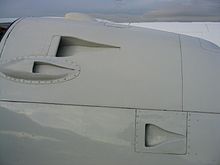The US FDA’s proposed rule on laboratory-developed tests: Impacts on clinical laboratory testing
Contents

A NACA duct,[1] also sometimes called a NACA scoop or NACA inlet, is a common form of low-drag air inlet design, originally developed by the U.S. National Advisory Committee for Aeronautics (NACA), the precursor to NASA, in 1945.[2][3]
Design
Prior submerged inlet experiments showed poor pressure recovery due to the slow-moving boundary layer entering the inlet. The NACA design is believed to work because the combination of the gentle ramp angle and the curvature profile of the walls creates counter-rotating vortices which deflect the boundary layer away from the inlet and draws in the faster moving air, while avoiding the form drag and flow separation that can occur with protruding scoop designs.
Aircraft applications

When properly implemented, a NACA duct allows air to flow into an internal duct, often for cooling purposes, with a minimal disturbance to the flow. The design was originally called a submerged inlet, since it consists of a shallow ramp with curved walls recessed into the exposed surface of a streamlined body, such as an aircraft.
This type of flush inlet generally cannot achieve the greater ram pressures and flow volumes of an external design, and so is rarely used for the jet engine intake application for which it was originally designed, such as the North American YF-93 and Short SB.4 Sherpa. It is commonly used for piston engine and ventilation intakes.
Automobile applications

It is especially favored in racing car design.[4][5] Sports cars featuring prominent NACA ducts include the Ferrari F40, the Lamborghini Countach, the 1996–2002 Dodge Viper, the 1971–1973 Ford Mustang, the 1973 Pontiac GTO, the 1979 Porsche 924 Turbo, the Maserati Biturbo, the Nissan S130, and the Porsche 911 GT2. It is also prevalent in some motorcycle designs, such as the 1994–1997 Honda VFR750F or the 1994-1998 Ducati 916.
See also
References
- ^ Frick, Charles W., et al. NACA ACR No. 5120, An Experimental Investigation of NACA Submerged- Duct Entrances. NACA, November 13, 1945. Abstract, Full report.
- ^ "NACA UK Mirror report description page".
- ^ "MAGiC NACA Archive".
- ^ "Duct Soup – How A NACA Duct Works". Hot Rod. 18 July 2013.
- ^ Staniforth (2001). Race and Rally Car Sourcebook. ISBN 1-85960-846-9. (Practical guidance on designing and building NACA ducts for motor-racing applications)
Further reading
- Frick, Charles W.; Davis, Wallace F.; Randall, Lauros M.; Mossman, Emmet A. (October 1945). "An Experimental Investigation of NACA Submerged-Duct Entrances". NASA Scientific and Technical Information Program. Retrieved 2017-03-26.
NACA-ACR-5I20
- Warren Beauchamp (2000). "NACA Duct Rationale and Construction".
Practical experience of fabricating simple NACA ducts for ventilation of a HPV

















